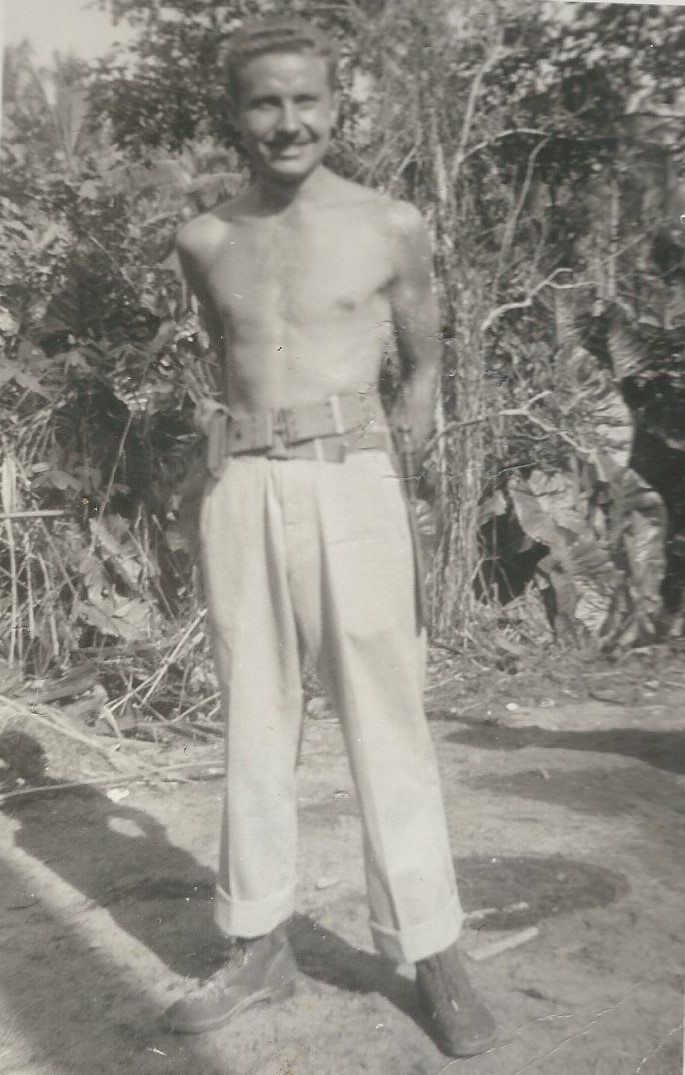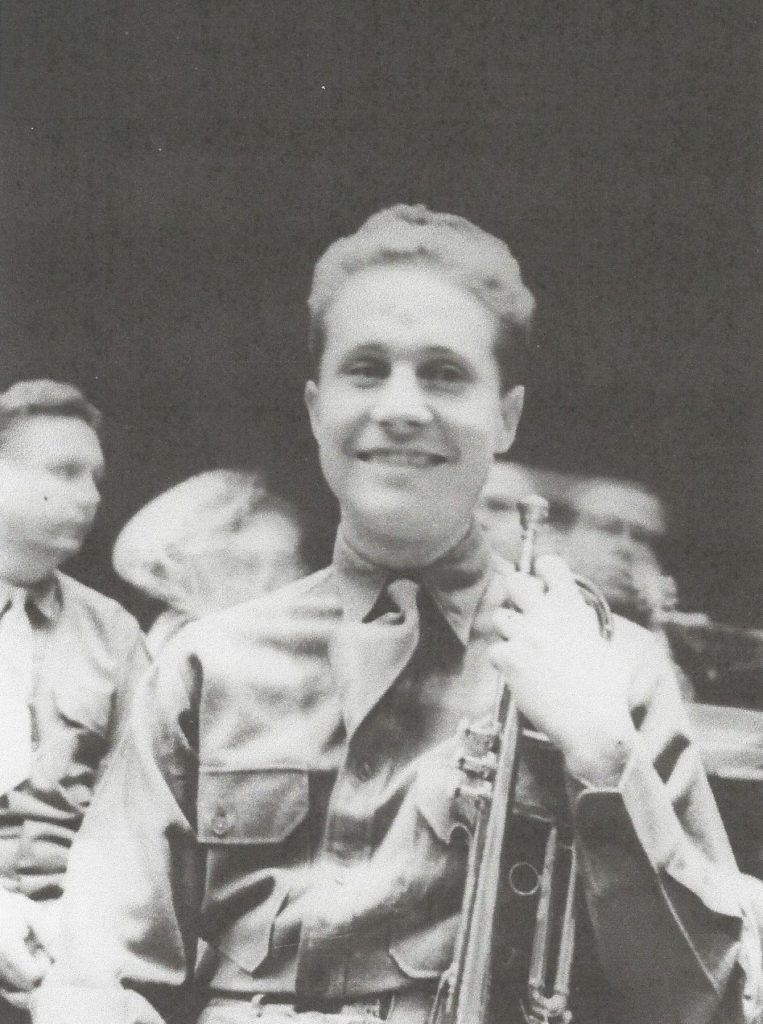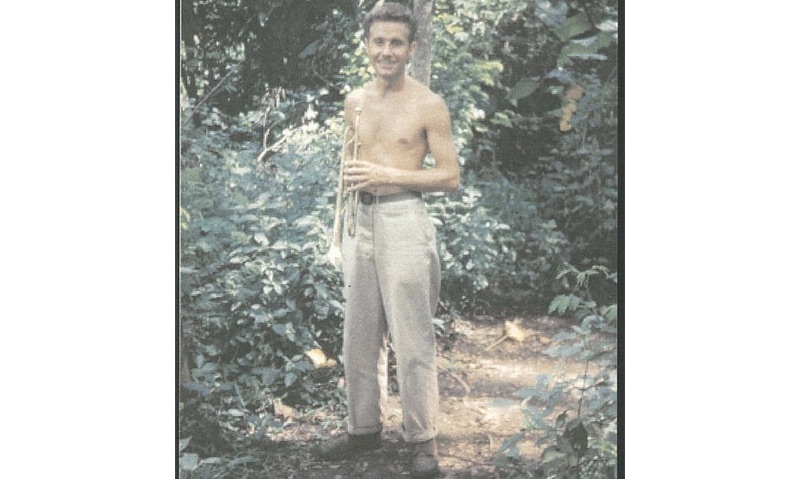As a child, almost every day growing up Jason Burt would hear the sounds of his grandfather, Julliard-trained Richard G. Burt, playing the trumpet in his home.
“We would go over there every day and he would babysit us,” Burt told HistoryNet. “You could hear him playing his trumpet…but I wasn’t actually listening.”
Burt’s grandfather, however, had entertained far more than his grandchildren with his talents. At the outbreak of World War II, the classically trained trumpet player volunteered his services and joined the 746th Air Force Band, stationed in the Philippines in 1944.
While in the Philippines they were, according to Burt, the only band to have been recorded on the front lines during the entirety of the Pacific War.
Burt, an avid history buff and the founder of the J&L Historical—a company that produces historical content for students—decided that the records deserved a home where the public could hear the 746th Air Force Band just as those GIs and Marines did in 1944.
And now, for the first time since the war’s end—and just in time for Veterans Day—the musical recordings will be available to a wider audience.
Titled “Sentimental Journey”, the 11-track album hearkens back to the days of the Greatest Generation. “It really has that nice, old timey sound to it,” said Burt. In addition to the album, audiences will be treated to nearly nine minutes of unearthed archival film of the Air Force band playing in the Philippines.
For the history buff, the music naturally brought back memories of his grandfather—“two tracks that I knew about my whole life that I’d heard Grandpa play were “Moonlight in Vermont” and “Trumpet Rhapsody”. But it also provided discovery—“there’s a song on there called “Perdido” where he does this crazy five second solo that is unbelievable. It’s such an upbeat song. That’s the one with all the talking back and forth [between the bandmates] in the in the beginning of the track. It’s probably my favorite one.”

After initially contacting the National WWII Museum in New Orleans, Burt was essentially told that the museum was interested, but that it didn’t produce music. There was also concern that the final product could look amateurish.
“The amateur thing really stuck with me,” Burt told HistoryNet. “I thought, ‘you know, [they’re] kind of right. These guys aren’t going to get that kind of attention just by throwing their album on the shelves, because no one’s going to know their story.’” From there, Burt’s idea began to evolve.
After researching sound technicians who won Grammys for best historical albums, he reached out to Gavin Lurssen and Rueben Cohen of Lurssen Mastering in Burbank, California. Both men were enthusiastic about taking on the project.
Covid-19 concerns initially stalled the project but led way for Burt to connect with the surviving family members of the 746th Air Force Band—prompting his desire to write a book about the band. It also led to him connecting with a New York-based sound engineer who had a connection to the project. Hiroyuki Sanada was born in Kanazawa, Japan and his own grandfather “was fighting in the same part of the world, but on the other side of the war…I think that’s why he was so dedicated to it and wanted to work really hard…this project brought both sides together,” Burt told HistoryNet. With the sound engineer’s expertise Sanada “was able to able to lower the sound and get rid of a lot of those vinyl sound pops” that was previously present.
While overseas, the 746th Air Force Band entertained scores of homesick troops, seemingly flung out to all corners of the Earth. When the “Angels of Bataan and Corregidor”—women in the United States Army Nurse Corps who were captured alongside GIs when the Philippines were overrun by the Japanese in 1941—were liberated in February of 1945, it was Richard’s band that played at their award ceremony.
“His contribution to the war was doing the thing that he was good at. To be able to make [troops] feel closer to home and not like they were in a war zone—maybe take their mind off what they were doing—was really important to him,” said Burt.
Honorably discharged as a corporal at war’s end, Richard was granted permission to bring the band’s recordings back to the States.

Some of the records include narration from Richard; listeners can hear him describe a guy setting up a stage around blown out palm trees—his commentary accompanied by the sound of gunfire snapping in the background.
It wasn’t until after his grandfather’s death in 2016 that Burt found the records—all five of them—in his grandfather’s attic. The records had been kept in perfect condition and possessed roughly 33 minutes of music.
From the proceeds Burt hopes to donate a portion of the earnings to the USO. “It just seems like a seamless fit,” he said.
For Burt, the remastered album is a chance to honor his grandfather and bring to light the band’s contribution to the war. It is also “an avenue to reach young students and show them that history is so much more than some facts in a book,” said Burt.
“How cool would it be if these guys had a platinum album and have this resurgence as a band that made this 75 years ago?”
Enjoy a snippet of “Perdido” below.
The album is available for pre-order at https://746thfeaf.com/store#!
[hr]





